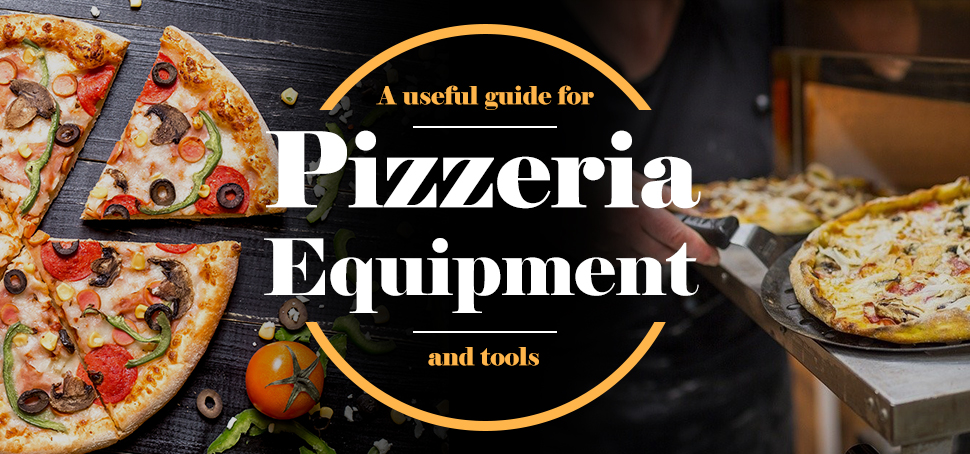Owning or managing a bar comes with its unique set of challenges, the primary among them being the selection of the right commercial bar equipment. The efficiency, atmosphere, and overall success of your bar heavily depend on the equipment you choose. From refrigeration systems like walk-in coolers and bottle coolers to essential bar blenders and juicers, each piece plays a pivotal role in day-to-day operations.
This comprehensive guide delves into the various types of commercial bar equipment essential for running a successful bar. We cover everything from specialized refrigeration units and bar warewash equipment to the indispensable bartending tools and supplies, ensuring your bar not only meets but exceeds the expectations of your patrons. Whether you’re setting up a new bar or looking to upgrade your existing setup, this guide provides valuable insights into the must-have commercial bar equipment to elevate your service and ambiance.
1. Bar Refrigeration and Ice Equipment
Refrigerators and coolers are crucial pieces of commercial bar supplies to keep all the drinks cool and store perishable products. There are various-sized coolers and refrigerators, so measuring your space and inventory before purchasing a commercial bar refrigerator will help you choose the right one.
a. Commercial Bar Refrigerators
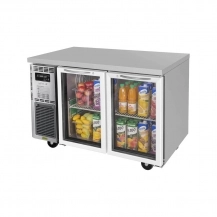
Commercial bar refrigerators are primary commercial bar equipment because a bar needs to store a wide range of things, such as bottled beverages or garnishes. The type of commercial refrigerator should be chosen depending on the available space and the required capacity. The most popular one is a reach-in refrigerator that can fit into most areas and can hold too many items of any shape. They vary in size; there are one-section types for smaller businesses and ones with multiple compartments for large operations. Large-scale businesses may opt for walk-in refrigerators as the number of clients they serve will require plenty of items.
Underbar refrigerators are another option for a bar, which can fit under a bar or counter. They are great to keep the constantly needed ingredients at hand, such as garnishes used in cocktails.
b. Bottle Coolers
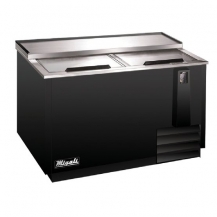
You need a bottle cooler to keep all the beverages cold if you run a bar. Cold air disperses throughout the unit with air circulation, keeping all the items at proper temperatures. They can feature solid doors that keep cold air locked inside or glass doors that allow customers to view inside without opening it, simultaneously displaying merchandise.
Some bottle coolers do not have their own cooling system, using ice instead. They can be handy for outdoor use, where you’ll need an electric source for standard coolers.
c. Commercial Wine Coolers
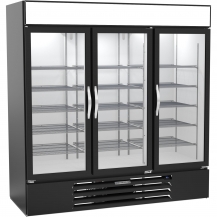
Since standard coolers or refrigerators are too cold to store wine, commercial wine coolers are made especially for wine. If wine is kept under or over the proper temperature limits, it may freeze and lose its flavor. Most commercial wine coolers have a glass door that lets you display your wines, and they can be in various sizes.
d. Glass Frosters and Chillers
To keep your drinks cool longer, just put your glasses into the froster and take them out cooled when you need them. Glass frosters are perfect, especially for cocktails and beer. They can contain 90 to 350 glasses at a time, depending on the size of the unit.
e. Ice Equipment
- Commercial Ice Makers: A bar can not operate without ice. To ensure you have ice all the time you need, you need to purchase a durable, heavy-duty ice maker. A commercial ice maker needs a water supply to make ice, and the modular ones need an ice bin or dispenser to contain the ice it makes. You can get ones that include an ice bin, so you won’t need to buy an extra one. (You can also take a look at our article for the details about commercial ice maker machines.)
- Ice Bins: Portable ice bins do not have to be attached to ice makers. You can take them wherever you need in the bar with the help of the wheels they have. They can keep 20 lbs. to 300 lbs. (9 to 136 kg) of ice, so you should consider the amount of ice you need depending on the volume of your business.
2. Commercial Bar Blenders, Juicers, and Mixers
Commercial blenders and mixers are the essential pieces of commercial bar equipment designed to mix and blend items to create cocktails, milkshakes, and several more drinks. Since a bar blender can make loud noises, it needs a sound enclosure that reduces interruption to let you operate naturally.
a. Bar Blenders
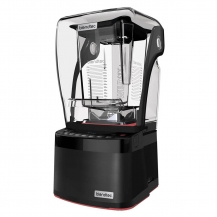
Bar blenders mix beverages and crush ice, so as commercial bar equipment, they are perfect for frozen drinks such as margaritas and pina coladas. Unlike other mixers, they can break solid items quickly, but this causes them to make loud noises. Stainless steel, glass, and polycarbonate are the most popular materials they are made from.
Steel is the most durable one, but you can not see inside, so you can not check the consistency of the drink without opening the lid. Glass and polycarbonate are seethrough so that the drink can be checked easily. Still, glass can easily break so polycarbonate will be the most durable one in this way. The important factor when choosing a blender is horsepower. Higher horsepower will provide more power and so a faster blend in less time.
b. Citrus Juicers
Various cocktails and drinks created with freshly made fruit juices are what people expect in a bar. The reamer is the most basic juicer, a portable tool consisting of a conical blade allowing you to separate the pulp from the juice. Squeezer is a more advanced version of it, which consists of long handles that provide more power to squeeze and save you from dirtying your hands. For faster operations, commercial juice machines are what you need.
c. Drink Mixers
Drink mixers, mostly known as spindle mixers, are for mixing solid items into smooth ingredients. They are mostly used for milkshakes and cocktails. They can be preferred because they do not have the loud noise a bar blender has. You should consider your production volume and the capacity and cost of the mixer before purchasing a commercial drink mixer.
d. Bar Beverage Dispensers
Commercial beverage dispensers keep drinks cool and serve as showcases with colorful beverages inside. Some of them are refrigerated, while some are designed to keep cold drinks from freezing. Of course, beer dispensers are the primary ones for a bar.
e. Beer Dispensers
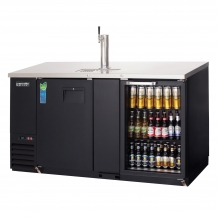
Commercial beer dispensers, also called kegerators, distribute draught beer directly from the barrel. The yeast remains active in barreled beer, unlike bottled ones, making it more flavorful and richer. Since the beer requires specific temperatures to stay quality, beer dispensers have a refrigeration system for it. Beer needs to be pushed up to a beer tower; hence dispensers use carbon dioxide to force beer up via a faucet that is poured into a mug.
f. Cocktail Dispensers
Like most other drink dispensers, you can efficiently serve cocktails directly from the tap, speeding service time up. Like beer dispensers, cocktail dispensers use carbon dioxide to create pressure, which pushes the drink up. They allow you to make several cocktails at one time, saving you time.
g. Frozen Drink Machine

Frozen drink machines are generally used to dispense frozen beverages like margaritas, milkshakes, or slushies like slushie machines. You don’t need to add ice since they can make ice on their own. It is important to purchase ones designed for alcoholic drinks since alcohol will freeze slower. You pour the drink into the tank and watch the machine convert it into crystal ice drinks. (Please take a look at our article for this commercial restaurant equipment at https://www.chefsdeal.com/blog/frozen-drink-machines .)
3. Bar Warewash
Commercial dishwashing equipment is also an important station of commercial bar equipment. Glasswashers and dishwashers are very important for hygiene and supporting continuous service.
a. Glass Washers
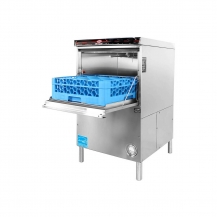
Glasswashers are explicitly designed for glasses, which feature a more gentle water flow ideal for thin glassware. There are door and rotary washers. Door washers are easy to operate, open the doors, put the glasses, and leave the rest in the washer. Rotary washers have a rotating rack that moves inside the chamber, and you get the clean glasses after this rotation.
Glasswashers can be either low or high temperatures. High-temperature glasswashers require condensate hoods. The high temperatures sanitize swiftly, eliminating the need for chemicals. Low-temperature glasswashers require chemical sanitizers to sanitize, but you will not need a condensate hood.
b. Dishwashers
Obviously, there will be other dishes than just glassware that need to be washed up, such as plates, pots, pans, etc. That’s why you need a commercial dishwasher for your bar.
You can purchase an underbar dishwasher suitable for a bar since they do not serve a large variety of food. Door-type dishwashers can wash up to 350 racks a day. If a bar has a high amount of dishes to be washed, investing in a conveyor dishwasher will be proper.
4. Commercial Sinks
In busy times at the bar, a dishwasher may not be enough to wash all the dishes, or there may be some tools that can’t be washed in a dishwasher. These are why a bar needs commercial sinks aside from just washing hands, and we put them on our commercial bar equipment list.
a. Compartment Sinks
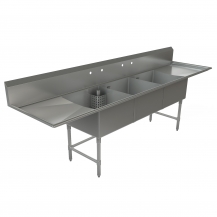
Compartment sinks can have one to four sections. A standard three-compartment sink is the most popular one, used to wash glass, utensils, or tools used in food preparation. Each compartment has a different function; the first is used to rinse the items, then they are cleaned with soapy water in the second, and the third is for sterilizing them.
Sinks are often made from stainless steel, which is the most durable one. Some of them can have drainboards, which let you dry the dishes, and storage bases, which allow you to use under the compartment as a storage area.
b. Underbar Sinks
Similar to standard sinks, underbar sinks can have one or more compartments, and they are small enough to fit under the bar. They are generally used to wash hands, dump unwanted drinks, and tiny clean tools. Like ordinary sinks, they may have storage bases, drainboards, and backsplashes. Your available space determines the size of the sink.
5. Bar Storage
- Glass racks: To efficiently use the limited space, ease the bartender’s work, and store the glassware safely, you need glass racks. A glass rack can be made of metal or oak and mounted to the wall or hanging overhead, letting the bartender work safely and reach glasses easily.
- Dry Bar Storage Cabinets: Cabinets with no refrigeration systems are needed to store alcoholic beverages, which must be kept at room temperature. The wire shelves have provided more available space. With open front cabinets, you can draw customers’ attention to drinks and create an attractive ambiance.
- Glassware: Glassware is as important as the drink it holds. It can help customize a tabletop presentation so that it is a one-of-a-kind, personalized experience for clients. There is various glassware for different kinds of drinks. Some of them are shot glasses, wine glasses, rocks glasses, pint glasses, champagne glasses, martini glasses, etc.
6. Bartending Tools and Supplies
A bar can do nothing without a skilled bartender who knows how to perform effectively behind the bar and create various quality drinks. To accomplish so, bartenders need more than just the beverages and drink ingredients. The proper commercial bar equipment and tools are what they need to mix and serve drinks efficiently. There are so many specialized bartender tools, such as;
- Muddlers
- Cocktail shakers
- Cocktail spoons
- Pourers for liquor bottles
- Ice cube trays and ice molds
- Cap Catchers
- Cocktail strainers
- Garnishing tools Muddling supplies
- Wine openers
- Straws and stirrers
7. Bar Furniture
The appearance and ambiance of an establishment have the most significant impact on customers. Your bar furnishings, among the commercial bar equipment, should create a warm area and make customers feel comfortable making a good impression.
You need to choose the number and the type of tables and chairs based on your available space. The rectangular shape is the most space-saving dinner table, coming with high-back bar chairs.
Bar tables are higher than standard tables, and so are the bar stools too. Bar stools come in various shapes, sizes, and types. Benches and sofas are the other furniture pieces that can be stored in a bar to create various sitting areas. (For further information, you can take a look at our article about choosing restaurant/bar furniture at https://www.chefsdeal.com/blog/how-to-choose-restaurant-furniture .)
Conclusion
As a bar owner or one willing to own, let your business surpass others with the right commercial bar equipment and tools. A complete and effective setup allows you to provide clients with high-quality service. Visitors who receive excellent service become repeat clients. By purchasing the proper commercial bar supplies, you’ll be able to offer amazing beverages to your clients while optimizing your bar operations.






